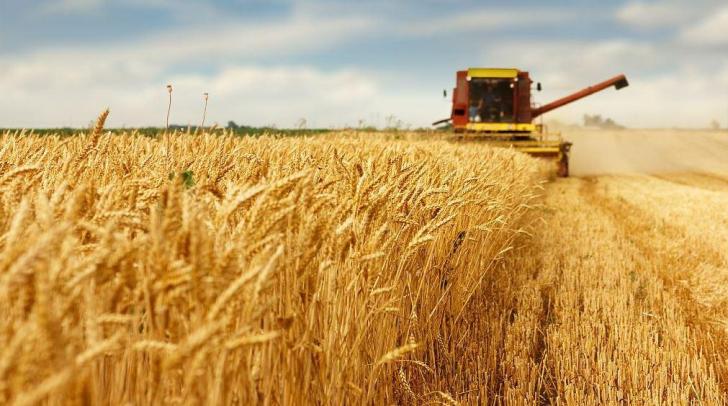News / National
Zimbabwe on course to break winter wheat production record
03 Nov 2024 at 10:06hrs |
1 Views

Zimbabwe is poised to set a new winter wheat production record, with farmers having already harvested over 490,000 tonnes this season, a milestone that highlights the nation's agricultural revival in recent years. Approximately 121,900 hectares were dedicated to wheat this year, the largest area cultivated since commercial production began in the 1960s.
So far, farmers have reaped 490,723 tonnes from 98,719 hectares, achieving an average yield of five tonnes per hectare. This harvest has already surpassed last year's record-breaking 460,000 tonnes. Projections indicate that total production could exceed 600,000 tonnes, far outstripping Zimbabwe's annual requirement of 360,000 tonnes. This surplus is expected to help stabilize prices for staple foods like bread, a key dietary item.
In an interview with The Sunday Mail, Mr. Leonard Munamati, acting chief director for Agricultural Advisory and Rural Development Services (AARDS) at the Ministry of Lands, Agriculture, Fisheries, Water and Rural Development, reported that the crop quality is high, with yields comparable to last year's record harvest.
"Harvesting is ongoing, with the area harvested standing at 98,719ha and an estimated production of 490,723 tonnes. The quality is good, with an average yield of five tonnes per hectare," said Mr. Munamati.
The increased cultivation has led to a rise in sightings of quelea birds, which pose a threat to wheat crops. However, Mr. Munamati confirmed that control teams were vigilant, using nine drones, knapsack sprayers, and vehicle-mounted sprayers to manage the bird population.
The successful harvest, Mr. Munamati noted, can be attributed to strategic planning and comprehensive Government support. Farmers were trained on scouting and reporting quelea roosting and breeding sites, and ample supplies of bird control chemicals were available.
"This season shows that Zimbabwe has the potential to further increase wheat production, potentially even for export," he said, underscoring the role of Government and private sector collaboration in the year's achievements.
Private sector engagement, adherence to optimal planting schedules, and dedicated power supplies for wheat farmers have all been instrumental. "Ring-fencing electricity for wheat farmers boosted productivity. We also encourage financiers to consider electricity as an essential input, while close monitoring by farmers has improved input utilization," he said.
With Ethiopia, Zimbabwe is one of the few African countries to achieve wheat self-sufficiency over the past two years, a remarkable accomplishment in a continent largely reliant on wheat imports.
So far, farmers have reaped 490,723 tonnes from 98,719 hectares, achieving an average yield of five tonnes per hectare. This harvest has already surpassed last year's record-breaking 460,000 tonnes. Projections indicate that total production could exceed 600,000 tonnes, far outstripping Zimbabwe's annual requirement of 360,000 tonnes. This surplus is expected to help stabilize prices for staple foods like bread, a key dietary item.
In an interview with The Sunday Mail, Mr. Leonard Munamati, acting chief director for Agricultural Advisory and Rural Development Services (AARDS) at the Ministry of Lands, Agriculture, Fisheries, Water and Rural Development, reported that the crop quality is high, with yields comparable to last year's record harvest.
"Harvesting is ongoing, with the area harvested standing at 98,719ha and an estimated production of 490,723 tonnes. The quality is good, with an average yield of five tonnes per hectare," said Mr. Munamati.
The increased cultivation has led to a rise in sightings of quelea birds, which pose a threat to wheat crops. However, Mr. Munamati confirmed that control teams were vigilant, using nine drones, knapsack sprayers, and vehicle-mounted sprayers to manage the bird population.
The successful harvest, Mr. Munamati noted, can be attributed to strategic planning and comprehensive Government support. Farmers were trained on scouting and reporting quelea roosting and breeding sites, and ample supplies of bird control chemicals were available.
"This season shows that Zimbabwe has the potential to further increase wheat production, potentially even for export," he said, underscoring the role of Government and private sector collaboration in the year's achievements.
Private sector engagement, adherence to optimal planting schedules, and dedicated power supplies for wheat farmers have all been instrumental. "Ring-fencing electricity for wheat farmers boosted productivity. We also encourage financiers to consider electricity as an essential input, while close monitoring by farmers has improved input utilization," he said.
With Ethiopia, Zimbabwe is one of the few African countries to achieve wheat self-sufficiency over the past two years, a remarkable accomplishment in a continent largely reliant on wheat imports.
Source - The Sunday Mail
Join the discussion
Loading comments…
































